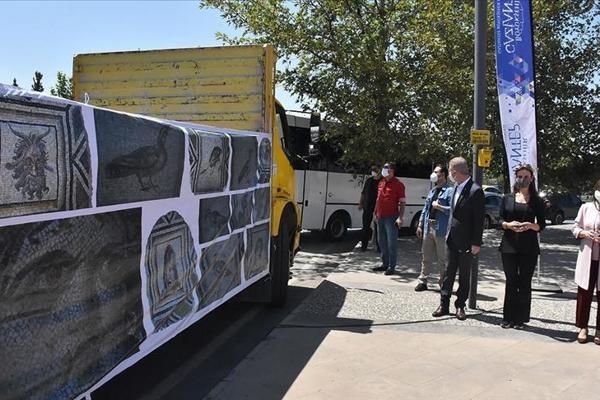Replicas of Turkey’s ‘Gypsy Girl’ mosaic sent to US for display
GAZİANTEP


Copies of 12 pieces of the "Gypsy Girl" mosaic, brought from the U.S. to southeastern Gaziantep in Turkey in 2018, were sent to be exhibited in the American state of Ohio.
The pieces will be open to visitors at The Wolfe Center For The Arts at Bowling Green State University.
The artifacts were unearthed during a ceremony in front of the Zeugma Mosaic Museum, said Gaziantep Governor Davut Gül.
Gül expressed that the museum made a welcoming area with the municipality in the ancient city of Karakamış and it would close the top of the ancient city.
He noted that work on construction of a museum consisting of artifacts in Karikamış continues, saying that another welcoming area was also built in the ancient city of Zeugma, as well as an 8-kilometer (5-mile) tourism road so people can reach the city.
“The remaining part of the completion of the restoration of Rumkale, the pearl of the Euphrates, was auctioned this year,” he added.
They are the most important works of the Roman, Hittite, Ottoman, Seljuk and Republican periods in Anatolian geography, said Mayor Fatma Şahin.
"Anatolian geography is an open-air museum. Cultural heritage in the world is now a rising value. Now, the world of 'the more gold, oil and natural gas you have, the richer you are' is over. Now, how much cultural heritage you have, how much trained human power you have, how rich we all bear witness to the world order,” said Şahin. “As Gaziantep, we are the biggest bridge and carrier of this great civilization. We make a great effort to introduce the beautiful works of five ancient cities located at zero point in history to the world together.”
"We have restored places that we did not look after as we saw them as ruins, that we were not interested in, and brought them back to our country and the world. Today we have received tremendous support from all relevant ministries,” she stressed.
"Zeugma means Roman era, Gypsy Girl means our Mona Lisa,” she said, mentioning that “The Gypsy Girl was alone. She waited 60 years to be reunited with her family.”
“We've seen these works at Bowling Green State University. We immediately requested it from our ministry. But its previous management at the university did not accept this. We applied again when the university rector changed,” she said.
“According to our protocol, we returned the Gypsy Girl to her family, but in the second phase, we had an important word for them. We did replicas of these works. Thanks to our Mosaic masters, we have made the stones of the Euphrates in accordance with the original.
“The works have been studied for about two years. Now we're sending these works to Bowling Green State University, the U.S.," she added.
After the speeches, the replicas loaded onto a truck were sent to Gaziantep Airport and then to the US.
